Welcome to Catnapin's
Aquatic Plant Gallery
Fern
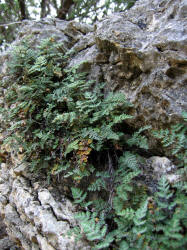
_small.jpg)
_small.jpg)
Pteridaceae - Desert Fern family
Slender Lip Fern Cheilanthes feei
Grows in limestone cracks, in shade, during damp warm weather.
Leaves can get 8" long but I have never seen them more than 4" long.
Photos taken in Taylor County, Texas, May 2007
(Native of Texas - Brown, Coke)
Similar Species
Alabama Lip Fern Cheilanthes alabamensis
Leaflets spaced wide on stem, pointed.
(Native of Texas - Brown)
Eaton's Lip Fern Cheilanthes eatonii
Leaflets are wide and touch, almost round, dusty green with matted hair.
(Native of Texas - Brown, Coke)
Fairy Swords Cheilanthes lindheimeri
Leaflets very lumpy, no space between leaflets, turn red/brown.
(Native of Texas - Brown)
Rough Lip Fern Cheilanthes horridula
Leaflets are not lobed, surface lumpy like course sandpaper.
(Native of Texas - Coleman, Brown, Coke)
Woolly Lip Fern Cheilanthes tomentosa
Very wooly. Most leaflets are entire or have only two small lobes at base. Similar to Cheilanthes eatonii
(Native of Texas - Coleman, Brown)
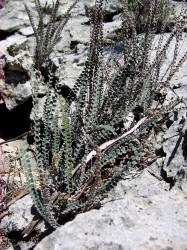
_small.jpg)
_small.jpg)
Pteridaceae - Desert Fern family
Cochise Scaly Cloak Fern Astrolepis cochisensis
These narrow erect ferns are very sun tolerant. Leaflets oval to nearly circular
with 0-3 shallow lobes. White scales speckle upper surface. Lower surface
covered in brown felt dotted by white scales.
Grows in limestone cracks, shade to full sun, damp warm
weather. Leaves can grow to 16" long. The genes name refers to the
hairs that grow in a star pattern. Poisonous to sheep and goats.
Photos taken in Taylor County, Texas, August 2009
(Native of Texas - Brown)
Similar Species
Hybrid Cloak Fern Astrolepis integerrima
Very similar to Astrolepis cochisensis. Leaflet shapes are highly
variable but have uneven lobes. Upper surface covered in soft silver scales.
(Native of Texas - Coleman, Brown, Coke)
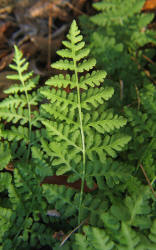
_small.jpg)
Dryopteridaceae - Wood Fern family
Common Woodsia (Blunt-lobed Woodsia) Woodsia obtusa
Fern grows to 18" tall and twice as wide.
Photos taken in Van Zandt County, Texas, November 2006
(Native of Texas, east & central - not listed in my area)
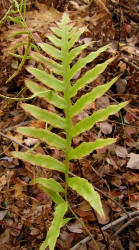
_small.jpg)
Blechnaceae (Polypodiaceae) - Deerfern family
Netted Chain Fern Woodwardia areolata
Sterile frond. Leaflets (pinnae) are alternate. A fertile frond has
narrow leaflets (pinnae) and chain-like bumps (sori) on the back
containing spores. Fronds grow 18"-24" tall. Leaf stalk
(stripe) is dull green, scaly on the underside, and the base is reddish.
Photos taken in Smith County, Texas, November 2006
(Native of east Texas - not listed in my area)
Similar Species
Blechnaceae (Polypodiaceae) - Deerfern family
Virginia Chain Fern Woodwardia virginica
Lower leaflets (pinnae) have lobed edge.
(Native of east Texas - not listed in my area)
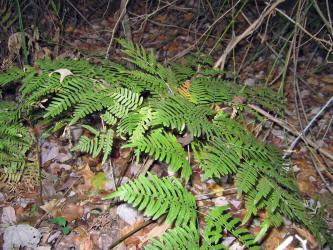
_small.jpg)
_small.jpg)
Dennstaedtiaceae - Bracken family
Western Bracken Fern Pteridium aquilinum
This plant (not the specific variation) can be found all over the world
except in cold or dry areas. Leaflets (pinnae) are alternate.
Plant can grow to 3-5 feet tall. Spores grow along the underside
edge of the leaflets (pinnae). Leaf stalk (stripe) is green,
smooth on the underside, and the base is dark brown. The rhizomes
can grow to 1" wide and 20 feet long and 10 feet deep.
Toxic, contains carcinogens. In clear-cut it becomes dominant
because it can produce substances that prevent growth of woody
plants. Its Rhizomes survive fire damage and the spores like the
alkaline soil of ashes.
Photos taken in Smith County, Texas, November 2006
(Native of east Texas - not listed in my area)
|
Also see:
Asparagus Fern Pin-clover Yarrow Wild Carrot |